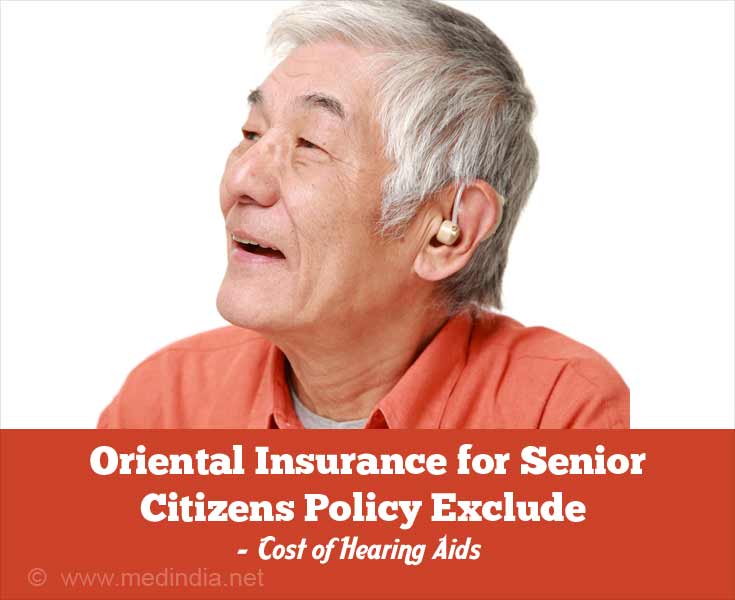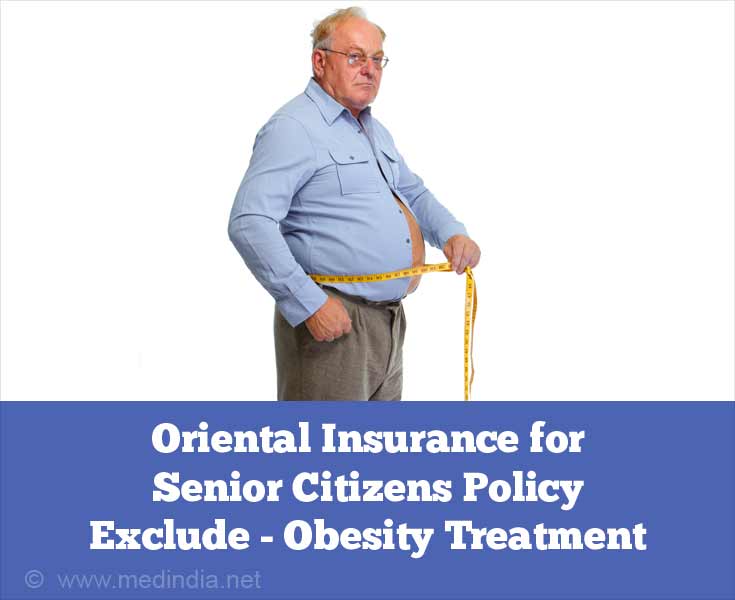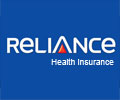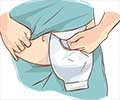About
The Oriental Insurance Company Ltd. came into effect at Mumbai on 12th September, 1947. The Oriental insurance company has about 14000+ employees comprising of the best-qualified professionals to fulfill customer satisfaction and has developed various insurance covers to reach out to the needs of both the urban and rural people in India.
The Oriental Insurance Company’s Senior Citizen Specified Diseases Insurance is solely designed for senior citizens, which provides benefits of maximum insurance of 5lakh rupees.

The salient features of the Senior Citizen Specified Diseases Insurance are:
- This insurance is designed only for senior citizens aged 60 years and above.
- The minimum sum insured starts from Rs. 100,000/- and higher sum insured that can be selected is in multiples of Rs 100,000/- up to Rs 5,00,000/-
- This senior citizen policy is available for sum insured 1 lakh, 2 lakhs, 3 lakhs, 4 lakhs and 5 lakhs.
- There is compulsory co-payment of 20% on admissible claim amount.
- There is a premium discount for selecting voluntary co-payment
- No claim discount in premium
- Loading for new entrants
- TPA facility is available
- Cashless service is done through TPA only and is limited to only Rs. 1 Lakh
- The policy can be continued if it is already insured with any medi-claim policy of the company
To avail the benefits of senior citizen policy the proposer has to submit any of the following documents as age proof:
- Pan card
- Passport
- Birth Certificate
- Driving License
- Photo Voter Identity Card
- School Leaving Certificate
- Matriculation Certificate
Scope of Cover/Benefits:
The following specified diseases / illness/ injury are payable under the senior citizen policy and the maximum liability of the Company in case of any disease or injury shall be as follows:
| Sr. no. | Name of Disease | Maximum limit of sum insured by the company per illness (including domiciliary hospitalization benefit, if any) |
| 1. | Accidental Injury | 100% of Sum Insured |
| 2. | Knee Replacement | 70% of Sum Insured |
| 3. | Cardio-Vascular Diseases | 50% of Sum Insured |
| 4. | Chronic Renal Failure | 50% of Sum Insured |
| 5. | Cancer | 50% of Sum Insured |
| 6. | Hepato-Billiary Disorders | 50% of Sum Insured |
| 7. | Chronic Obstructive Lung Diseases | 20% of Sum Insured |
| 8. | Stroke | 20% of Sum Insured |
| 9. | Benign Prostrate | 15% of Sum Insured |
| 10. | Orthopedic Diseases | 15% of Sum Insured |
| 11. | Ophthalmic Diseases | 10% of Sum Insured |
Note: The company’s legal responsibility in respect of all claims admitted during the period of insurance shall not surpass the sum insured per person mentioned as in the policy/schedule.
- All the reasonable & necessary expenses up to the following limits are payable/reimbursable under the senior citizen policy, for the specified diseases/illness/injury only, within the overall limit as mentioned above.
- Room charges- Room, boarding including nursing care as provided by the Hospital/Nursing Home should not exceed 1% of the Sum Insured per day.
- Intensive Care Unit (I.C.U.) expenses should not exceed 2% of the sum insured per day.
Note: Stay in the room and in the I.C.U., if required, should not be more than total number of days of admission in the hospital
- Ambulance services charges per illness by registered ambulance – Actual expenses or Rs 1000/- whichever is less shall be reimbursable in case the patient has to move from residence to hospital in case of admission in Emergency Ward / I.C.U. or from one Hospital/Nursing home to another Hospital/Nursing Home for hospitalization.

- Surgeon, Anesthetist, Medical Practitioner, Consultants, Specialists Fees
- Blood, Oxygen, Anesthesia, Operation Theatre Charges, Surgical Appliances, Chemotherapy, Radiotherapy, Medicines & Drugs, Dialysis, Relevant Laboratory / Diagnostic test, X-Ray, Artificial Limbs, Cost of Prosthetic devices implanted during Surgical procedure like pacemaker, etc.
Premium Rates Chart
| Age group | Sum Insured Rs. | ||||
| 100000 | 200000 | 300000 | 400000 | 500000 | |
| Premium in Rs. | |||||
| 61-65 | 4500 | 8700 | 12400 | 16100 | 19700 |
| 66-70 | 4800 | 9100 | 13100 | 16900 | 20700 |
| 71-75 | 5700 | 11400 | 16300 | 21500 | 26100 |
| 76-80 | 6100 | 12000 | 17100 | 22700 | 27600 |
| Above 80 years | 6400 | 12600 | 18100 | 23800 | 29000 |
| Premium will be loaded by 10% for new entrants | |||||
Terms & Conditions
1. Entire Contract: The policy, proposal form, prospectus and declaration given by the insured person shall represent the complete contract of insurance. Only insurer may change the terms and conditions of this policy/contract. Any changes that may be made by the insurer shall be given by a duly signed and sealed endorsement on the policy.
2. Communication: Every notice or communication to be given or made under this policy shall be delivered in writing at the address of the policy issuing office/Third Party Administrator as shown in the Schedule.
3. Payment of Premium: The premium payable under this policy shall be paid in advance. No receipt for premium shall be valid except on the official form of the company signed by a duly authorized official of the company. The due payment of premium and the observance and fulfillment of the terms, provisions, conditions and endorsements of this policy by the Insured Person in so far as they relate to anything to be done or complied with by the Insured Person shall be condition precedent to any liability of the company to make any payment under this policy. No waiver of any terms, provisions, conditions and endorsements of this policy shall be valid, unless made in writing and signed by an authorized official of the company.
4. Notice of Claim: Immediate notice of claim with all the necessary documents relating to policy number, ID Card No., name of insured person in respect of whom claim is made, nature of disease/illness/injury and name and address of the attending medical practitioner/Hospital/Nursing Home etc. should be given to the company/TPA while taking treatment in the Hospital/Nursing Home by fax or email. Such notice should be given within 48 hours of admission or before discharge from Hospital/Nursing Home, whichever is earlier, unless waived in writing by the company.
5. Claim Documents: Final claim along with hospital receipted original Bills/Cash memos/reports, claim form and list of documents as listed below should be submitted to the company/TPA within 7 (seven) days of discharge from the Hospital/Nursing Home.
- Original bills, receipts and discharge certificate/card from the hospital.
- Medical history of the patient recorded by the Hospital.
- Original Cash-memo from the hospital(s)/chemist(s) supported by proper prescription.
- Original receipts, pathological and other test reports from a pathologist/radiologist including film, etc supported by the note from attending medical practitioner/surgeon demanding such tests.
- Attending Consultants/Anesthetists/Specialist certificates regarding diagnosis and bill/receipts etc.
- Surgeon’s original certificate stating diagnosis and nature of operation performed along with bills/receipts etc.
- Any other information required by TPA/Insurance Company.
- All documents must be duly attested by the insured person.
In case of post hospitalization treatment (limited to 60 days) all supporting claim papers/documents are listed above should also be submitted within 7 (seven) days after completion of such treatment, (upto 60 days or actual period whichever is less) to the company/T.P.A. The insured should also provide the company/TPA any additional information and assistance as the company/TPA may require in dealing with the claim.
NOTE: Waiver of the condition may be considered in extreme cases of hardship where it is proved to the satisfaction of the company that under the circumstances in which the insured was placed it was not possible for him or any other person on behalf of the insured to give such notice or file claim within the prescribed time limit. Otherwise company/TPA has a right to reject the claim.
6. Procedure For Utilizing Cashless Access Services In Network Hospital / Nursing Home:
- Claim in respect of Cashless Access Services shall be through the TPA provided admission is in a listed hospital in the agreed list of the networked Hospitals/Nursing Homes and is subject to pre admission authorization. The TPA shall, upon getting the related medical details/relevant information from the insured person/network Hospital/Nursing Home, verify that the person is eligible to claim under the policy and after satisfying itself shall issue a pre-authorisation letter/guarantee of payment letter to the Hospital/Nursing Home mentioning the sum guaranteed as payable, also the ailment for which the person is seeking to be admitted as in- patient.
- The TPA reserves the right to deny pre-authorisation in case the hospital/insured person is unable to provide the relevant information/medical details as required by the TPA. In such circumstances denial of Cashless Access should in no way be construed as denial of claim and/or deficiency of service. The insured person may obtain the treatment as per his/her treating doctor’s advice and later on submit the full claim papers to the TPA for reimbursement within 7 days of the discharge from Hospital/Nursing Home.
- In case any information available to the TPA/company which makes the claim inadmissible or doubtful requiring investigations, the authorisation of cashless facility shall be withdrawn. However, this shall be done by the TPA before the patient is discharged from the Hospital.
7. Non Admission of Claim:
A (I): Where the policy is being serviced by TPA, it shall repudiate the claim if not covered/not payable under the policy. The TPA shall mention the reasons for repudiation in writing to the insured person. The insured person may approach the policy issuing office of the company for any grievance relating to the claim. The company’s decision in this regard shall be final and binding on TPA.
A (II): Where the policy is serviced by the company and in case of repudiation of the claim, insured may approach the concerned Regional Office of the company for redressal of any grievance relating to the claim.
B: In case claim is repudiated by the Company as per A (1) & A (II) the insured person may approach the Chief Manager Grievance Cell of the Company’s Regd. Office situated at A-25/27, Asaf Ali Road, New Delhi-110002.
C. The Central Government has established office of the Insurance Ombudsman for redressal of grievances and the insured may approach the Insurance Ombudsman for redressal of his grievance. The insured may visit the site of http://www.ombudsmanindia.org/ for details.
D. Any medical practitioner authorized by the TPA/company shall be allowed to examine the Insured Person with/without prior notice in case of any alleged injury or disease requiring hospitalization when and so often as the same may reasonable be required on behalf of the TPA/company.
8. Fraud / Misrepresentation / Concealment: The Company shall not be liable to make any payment under this policy in respect of any claim, if such claim be in any manner (intentionally or recklessly or otherwise) misrepresented or concealed or involve any non disclosure of material facts or making false statements or submitting fake bills whether by the Insured Person or Institution/Organization on his behalf.
9. Contribution: If at the time when any claim arises under this policy, there is in existence any other insurance (other than Cancer Insurance Policy in collaboration with Indian Cancer Society) whether it be effected by or on behalf of any Insured Person in respect of whom the claim may have arisen covering the same loss, liability, compensation, costs or expenses, the company shall not be liable to pay or contribute more than its rateable proportion of any loss, liability, compensation, costs or expenses. The benefits under this policy shall however be in excess of the benefits available under Cancer Insurance Policy.
10. Cancellation Clause: Company may at any time, cancel this Policy by sending the Insured 30 days notice be registered letter at the Insured’s last known address and in such an event the Company shall refund to the Insured a pro-rata premium for un-expired Period of Insurance. (Such cancellation by the company may be for reasons such as intentional misrepresentation/malicious suppression of facts intended to misleading the insurance company about the acceptability of the proposal, lodging a fraudulent claim and such other intentional acts of the insured/beneficiaries under the policy). The company shall, however, remain liable for any claim which arose prior to the date of cancellation. The Insured may at any time cancel this policy and in such event the company shall allow refund of premium at company’s short period rate only (table given here below) provided no claim has occurred during the policy period up to date of cancellation.
| Period of Risk | Rate of premium to be charged |
| Upto 1 month | 1/4th of the annual rate |
| Upto 3 Months | 1/2 of the annual rate |
| Upto 6 Months | 3/4th of the annual rate |
| Exceeding 6 months | Full annual rate |
11. Arbitration Clause: If any dispute or difference shall arise as to the quantum to be paid under the policy (liability being otherwise admitted) such difference shall independently of all other questions be referred to the decision of a sole arbitrator to be appointed in writing by the parties or if they cannot agree upon a single shall be referred to a panel of three arbitrators, comprising of two arbitrators, one to be appointed by each of the parties to the dispute/ difference and the third arbitrator to be appointed by such two arbitrators and arbitration shall be conducted under and in accordance with the provisions of the Arbitration and Conciliation Act, 1996.
It is clearly agreed and understood that no difference or dispute shall be referable to arbitration as herein before provided, if the Company has disputed or not accepted liability under or in respect of this policy. It is hereby expressly stipulated and declared that it shall be a condition precedent to any right of action or suit upon this policy that award by such arbitrator/arbitrators of the amount of the loss or damage shall be first obtained.
12. Disclaimer of Claim: It is also hereby further expressly agreed and declared that if the TPA/company shall disclaim liability in writing to the Insured for any claim hereunder and such claim shall not within 12 calendar months from the date of such disclaimer have been made the subject matter of a suit in a court of law, then the claim shall for all purposes be deemed to have been abandoned and shall not thereafter be recoverable hereunder.
13. Payment Of Claim: The policy covers illness, disease or accidental bodily injury sustained by the insured person during the policy period anywhere in India and all medical/surgical treatment under this policy shall have to be taken in India and admissible claims thereof shall be payable in Indian currency without any interest thereof.
- Payment of claim shall be made through TPA to the Hospital/Nursing Home or to the Insured Person in case policy is serviced through TPA.
- In non TPA case the claim shall be paid to the insured person by the company.
Exclusions:
The Company shall not be liable to make any payment under this policy in respect of any expenses whatsoever incurred by any Insured Person in connection with or in respect of:
- Any disease/health condition/illness/ailment or any condition arising therefrom other than those specified in the policy as covered.
- Pre-existing health condition or disease or ailment/injuries: Any ailment/disease/injuries/health condition which are pre-existing (treated/untreated, declared/not declared in the proposal form), when the cover incepts for the first time are excluded upto 2 (two) years of this policy being in force continuously
- Surgery for correction of eye sight, cost of spectacles, contact lenses, hearing aids etc.

- For the purpose of applying this condition, the date of inception of the Mediclaim policy taken from the company shall be considered, provided the renewals have been continuous and without any break in period.
- This exclusion shall also apply to any complications arising from pre existing ailments/diseases/injuries. Such complications shall be considered as a part of the pre existing health condition or disease. To illustrate if a person is suffering from hypertension or diabetes or both hypertension and diabetes at the time of taking the policy, then policy shall be subject to following exclusions.
- Injury or disease directly or indirectly caused by or arising from or attributable to War, Invasion, Act of Foreign Enemy, War like operations (whether war be declared or not) or by nuclear weapons/materials.
- Circumcision (unless necessary for treatment of a disease included hereunder or as may be necessitated due to any accident), vaccination, inoculation or change of life or cosmetic or of aesthetic treatment of any description, hair transplant, plastic surgery other than as may be necessitated due to an accident or as a part of any illness/disease.
- Convalescence, general debility. “ run down” condition or rest cure, congenital external diseases or defects or anomalies, sterility, any fertility, sub- fertility or assisted conception procedure, venereal diseases, intentional self- injury/suicide, all psychiatric conception procedure, venereal diseases, intentional self- injury/suicide, all psychiatric and psychosomatic disorders and diseases/accident due to and or use, misuse or abuse of drugs/alcohol or use of intoxicating substances or such abuse or addiction etc.
- All expenses arising out of any condition directly or indirectly caused by, or associated with Human T-cell Lymphotropic Virus Type III (HTLD- III) or Lymohadinopathy Associated Virus (LAV) or the Mutants Derivative or Variations Deficiency Syndrome or any Syndrome or condition of similar kind commonly referred to as AIDS, HIV and its complications including sexually transmitted diseases.
- Expenses incurred at Hospital or Nursing Home primarily for evaluation/diagnostic purposes which is not followed by active treatment for the ailment during the hospitalised period.
- Expenses on vitamins, tonics, mineral water and allied items unless forming part of treatment for injury or disease as certified by the attending physician.
- Naturopathy treatment, unproven procedure or treatment, experimental or alternative medicine and related treatment including acupressure, acupuncture, magnetic and such other therapies etc.
- Expenses incurred for investigation or treatment irrelevant to the diseases diagnosed during hospitalisation or primary reasons for admission. Private nursing charges, Referral fee to family doctors, Out station consultants/surgeons fees etc.
- External and/or durable Medical/Non medical equipment like Ambulatory devices i.e. Walker, Crutches, Belts, Collars, Caps, Splints, Slings, Braces, Stocking etc of any kind, CPAP, CAPD, Infusion pump, Diabetic foot wear, Glucometer/ Thermometer, nebuliser and similar related items etc and also any medical equipment which is subsequently used at home etc.
- All non medical expenses including personal comfort and convenience items or services such as telephone, television, ward boy, ward lady/barber or beauty services, diet charges, baby food, cosmetics, napkins, toiletry items etc., guest services and similar incidental expenses or services etc.
- Change of treatment from one system of medicine to another unless necessitated and agreed/allowed by the TPA/company.
- Treatment of obesity or condition arising therefrom (including morbid obesity) and any other weight control programme, services or supplies etc.

- Any treatment required arising from Insured’s participation in any hazardous activity such as scuba diving, motor racing, parachuting, hang gliding, rock or mountain climbing, other allied similar activities etc.
- Any treatment received in convalescent home, convalescent hospital, health hydro, nature care clinic or similar establishments.
- Any stay in the hospital for any domestic reason or where no active regular medical treatment is given by the specialist/physician.
- Out Patient Diagnostic, Medical or Surgical procedures or treatments, non-prescribed drugs and medical supplies.
- Massages, Steam bathing, Shirodhara and like treatment under Ayurvedic treatment.
- Any kind of Service charges, Surcharges, Admission fees/Registration charges, File Charges etc levied by the hospital.
- Doctor’s home visit charges, Attendant / Nursing charges during pre and post hospitalisation period.
- Treatment which is continued before hospitalization and continued even after discharge for an ailment / disease / injury other than the one for which hospitalisation claim is made / admissible.
Definitions:
1. Hospital/Nursing Home: It refers to an admission in any institution which is meant for in-patient care and also day care treatment of illness and/or injuries. The hospital should be registered with the local authorities under the Clinical Establishments (Registration and Regulation) Act, 2010 or under the enactments specified in the Schedule of Section 56(1) of the said Act or the establishment should comply with all the minimum criteria as mentioned below:
- The hospital or the day-care should have a qualified medical practitioner in-charge all day and all night.
- The hospital or the day-care consists of at-least 10 inpatient beds in towns having a population of less than 10, 00,000 and 15 inpatient beds in all other regions.
- The hospital or the day-care consists of qualified nursing staff round the clock.
- The establishment has its own fully equipped operation theatre where surgical operations are carried out.
- The establishment maintains daily records of patients and makes these available to the Insurance Company’s authorized personnel.
- The Hospital or the Nursing home should not be a place of rest, home for the aged people, a rehabilitation center for drug addicts or alcoholics, a hotel or a similar place.
Note: In the case of Ayurvedic/Homeopathic/Unani treatment, the expenses of the hospitalisation are permissible only when the treatment is taken as an in-patient, in a Government Hospital/Medical College Hospital.
2. Hospitalisation period: Hospital expenses are permissible only if the hospitalisation is for a minimum period of 24 (twenty hours) hours.
3. Domiciliary Hospitalisation Benefit: This is a medical treatment for a period more than three days for an illness/disease/injury which in the normal course would require treatment at a hospital, but is actually taken at home under any of the following circumstances:
- The patient condition is such that he/she cannot be taken to a hospital.
- The patient is treated at home because of non-availability of room in a hospital.

4. Senior Citizen: It means an Indian citizen who has attained the age of sixty years as on the date of proposal.
5. Third Party Administrator (TPA): It means any company who has acquired a license from IRDA to exercise as a third party administrator (TPA) and is appointed by the company.
6. Network Provider: It consists of hospitals or healthcare providers engaged by an insurer or together by a TPA and an insurer to provide medical assistance to an insured on payment or by a cashless facility.
7. Hospitalisation Period: The minimum span of stay is 24 hours except for specified procedures/treatment where such admission could be for a period of less than 24 consecutive hours.
8. Pre-Hospitalisation Expenses: This refers to the medical expense for a period of 30 days before the date of admission to the hospital, provided that:
- These medical expenses are for the same condition/illness for which the Insured Person’s hospitalisation was needed.
- The claim for such hospitalisation is acceptable by the Insurance Company.
9. Post-Hospitalisation Expenses: This refers to the medical expenses for a period up to 60 days from the date of discharge from the hospital, provided that:
- These medical expenses are for the same condition/illness for which the insured person’s hospitalisation was needed.
- The claim for such hospitalization is acceptable by the insurance company.
10. Co-Payment: It is a cost-sharing requirement under a health insurance policy that provides that the policyholder/insured will bear a specified percentage of the acceptable claim amount. A co-payment does not reduce the sum insured.
11. Cashless Facility: It means a service given by the insurer to the insured where the payments of the treatment costs undergone by the insured is according to the policy terms and conditions and are directly made to the network provider by the insurer to the extent of a pre-authorisation approval.
Disclaimer: This information is extracted from the company’s official website to provide information to the general public. The information is likely to change based on the concerned insurance companies’ discretion. Alterations, deletions and/or additions to the existing policy products, coverage and their premiums may be enhanced or reduced. These figures are only guidelines. We recommend the individual to visit the official website of the insurance company for more details and updated matters.




![An Introduction - Indian General [Non-Life] Insurance Companies An Introduction - Indian General [Non-Life] Insurance Companies](https://www.medindia.net/images/common/patientinfo/120_100/health-insurance21.jpg)


















